|
|
|
Sort Order |
|
|
|
Items / Page
|
|
|
|
|
|
|
| Srl | Item |
| 1 |
ID:
110924
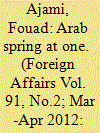

|
|
|
|
|
| Publication |
2012.
|
| Summary/Abstract |
Throughout 2011, a rhythmic chant echoed across the Arab lands: "The people want to topple the regime." It skipped borders with ease, carried in newspapers and magazines, on Twitter and Facebook, on the airwaves of al Jazeera and al Arabiya. Arab nationalism had been written off, but here, in full bloom, was what certainly looked like a pan-Arab awakening. Young people in search of political freedom and economic opportunity, weary of waking up to the same tedium day after day, rose up against their sclerotic masters.
|
|
|
|
|
|
|
|
|
|
|
|
|
|
|
|
| 2 |
ID:
131235
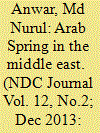

|
|
|
| 3 |
ID:
115071
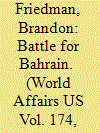

|
|
|
|
|
| Publication |
2012.
|
| Summary/Abstract |
After the popular uprisings that struck in Tunisia, Egypt, Libya, Bahrain, Yemen, and Syria, the surviving Middle East monarchies have come under heavy criticism in the West. Many believe it is only a matter of time until they are next. The conventional wisdom in the West is that this revolutionary change in the Middle East must be a positive thing. Popular demands for political freedom are viewed as part of the inevitable march of progress. Another implicit assumption in the West is that the monarchies, like the corrupt autocrats who have fallen, lack popular support.
|
|
|
|
|
|
|
|
|
|
|
|
|
|
|
|
| 4 |
ID:
170510


|
|
|
|
|
| Publication |
New York, Oxford University Press, 2020.
|
| Description |
xiv, 254p.hbk
|
| Standard Number |
9780190935962
|
|
|
|
|
|
|
|
|
|
|
|
Copies: C:1/I:0,R:0,Q:0
Circulation
| Accession# | Call# | Current Location | Status | Policy | Location |
| 059831 | 327.73009/NYE 059831 | Main | On Shelf | General | |
|
|
|
|
| 5 |
ID:
153211
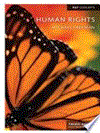

|
|
|
|
|
| Edition |
3rd ed.
|
| Publication |
Cambridge, Polity Press, 2017.
|
| Description |
ix, 256p.pbk
|
| Series |
Key Concepts Series
|
| Standard Number |
9781509510283
|
|
|
|
|
|
|
|
|
|
|
|
Copies: C:1/I:0,R:0,Q:0
Circulation
| Accession# | Call# | Current Location | Status | Policy | Location |
| 059107 | 323/FRE 059107 | Main | On Shelf | General | |
|
|
|
|
| 6 |
ID:
152602
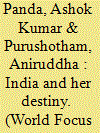

|
|
|
|
|
| Summary/Abstract |
The object of this thesis is to decipher and analyse India’s destiny, in the context of the struggle for freedom, in the first half of the twentieth century. The role and mission of Mahatma Gandhi, Netaji Subhas Chandra Bose and Dr. B.R. Ambedkar are central to our understanding of the developments, political and social, which culminated in India attaining political freedom in 1947.
|
|
|
|
|
|
|
|
|
|
|
|
|
|
|
|
| 7 |
ID:
123420
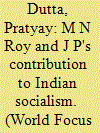

|
|
|
|
|
| Publication |
2013.
|
| Summary/Abstract |
Manendra Nath Roy (1886-1954) and Jayaprakash Narayan (1902-1979), both popularly known as M.N. Roy and J.P., occupy unique positions among the galaxy of political leaders produced by India in modern times. They played a major role not merely in the struggle for freedom from foreign rule, but also in shaping the minds of people as well as events after the achievement of our political freedom.
|
|
|
|
|
|
|
|
|
|
|
|
|
|
|
|
| 8 |
ID:
117021
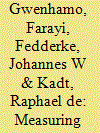

|
|
|
|
|
| Publication |
2012.
|
| Summary/Abstract |
This article presents a new dataset of indicators of political freedom, property rights and political instability for Zimbabwe for the period 1946 to 2005. The dataset is constructed by systematically coding the three concepts of political freedom, property rights and political instability along a multitude of dimensions. The lengthy time coverage of the dataset allows country-specific econometric analysis to evaluate generalizing propositions about the effects of political institutions on economic outcomes. The dataset also contributes to the dynamic analysis of the effects of political institutions on conflict, a contentious issue in political science. Correlations between the new measures reveal that while political instability has a strong and negative relationship with property rights, it has no significant relationship with political freedom. The finding supports the notion that political conflict is significantly higher in the in-between category of semi-democracy than at either end of the democracy scale. The validity of the dataset is supported by its strong correlations with other conceptually and operationally different measures of political institutions. The new dataset has begun to be employed in country-specific time-series studies of the link between institutions and economic outcomes. Two core results are that property rights influence the volumes of foreign direct investment (FDI) in Zimbabwe and that negative spillover effects of poor institutional environments can occur between neighbouring countries. It is feasible to extend the geographical coverage of the dataset by applying our methodological framework to other countries.
|
|
|
|
|
|
|
|
|
|
|
|
|
|
|
|
| 9 |
ID:
123989
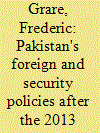

|
|
|
|
|
| Publication |
2013.
|
| Summary/Abstract |
This article examines the consequences of Nawaz Sharif's electoral victory in Pakistan's 2013 general election on the country's foreign and security policies. It analyses the relationships the new government is likely to entertain with the military institutions and the judiciary, and tries to identify the potential vulnerabilities of the new authorities.
It concludes that the security situation will improve marginally, at best, and that a relatively smooth working relationship with the US, dictated by the constraints of the US withdrawal from Afghanistan, can be anticipated.
Relations with India are likely to constitute the real test of the political freedom enjoyed by Prime Minister Nawaz Sharif vis-à-vis the military. The difficulty will be to calibrate the relationship to avoid provoking a backlash with the military.
|
|
|
|
|
|
|
|
|
|
|
|
|
|
|
|
| 10 |
ID:
128847
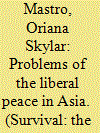

|
|
|
|
|
| Publication |
2014.
|
| Summary/Abstract |
The conviction that economic ties will engender peace is a lynchpin of US strategy, but Asian leaders view failure to protect territorial claims as worse than the losses associated with a limited war. The conviction that economic ties will engender peace in Asia has been a lynchpin of the US strategic response to a rising China for over two decades. When the US-China Relations Act of 2000 passed under President Bill Clinton, proponents of the measure argued that increased Sino-American trade would contribute to China's peaceful rise because Beijing would reject revisionism while it benefitted from the US-led world order. As one US senator commented at the time, 'the world will be a safer place - or so we hope, and so history argues'. Later, President George W. Bush described the exchange of 'many handshakes of friendship and commerce' between the American and Chinese people as enhancing understanding and therefore peace. Moreover, many of his closest advisers hoped that Chinese economic growth would eventually result in a rising middle class that would demand political freedoms and compel reform of the one-party Communist system. Most recently, President Barack Obama extolled the benefits of China's growing economic clout, declaring that 'a peaceful and stable and prosperous China is not only good for Chinese but also good for the world and for the United States'.
|
|
|
|
|
|
|
|
|
|
|
|
|
|
|
|
| 11 |
ID:
129464
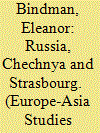

|
|
|
|
|
| Publication |
2013.
|
| Summary/Abstract |
This article explores contemporary Russian official and media discourse on cases concerning human rights violations in Chechnya which have been heard at the European Court of Human Rights. By comparing and contrasting the discourses on the Court's rulings which have been reproduced by various government representatives and various Russian newspapers, the article aims to demonstrate that, while official discourse remains critical of the Court's work with regard to Chechnya, reporting of such cases provides certain media outlets with the opportunity to criticise the government for its perceived failings in relation to safeguarding Chechnya's civilian population from human rights abuses.
|
|
|
|
|
|
|
|
|
|
|
|
|
|
|
|
| 12 |
ID:
161851
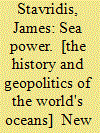

|
|
|
|
|
| Publication |
New York, Penguin Books, 2018.
|
| Description |
363p.pbk
|
| Standard Number |
9780735220614
|
|
|
|
|
|
|
|
|
|
|
|
Copies: C:1/I:0,R:0,Q:0
Circulation
| Accession# | Call# | Current Location | Status | Policy | Location |
| 059534 | 359/STA 059534 | Main | On Shelf | General | |
|
|
|
|
| 13 |
ID:
130250
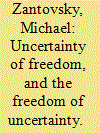

|
|
|
|
|
| Publication |
2014.
|
| Summary/Abstract |
It likely has occurred to everyone at least once that it would be a wonderful thing to win the lottery. And many of us have indeed bought a lottery ticket at least once in our lives, only to validate the well-known fact that the chances of winning in a lottery are rather small. Some of us, though, may have not put up with this sober conclusion and proceeded on the assumption that if we bought two tickets our chances of winning the lottery would increase twofold, and then perhaps extrapolated the logic to three, five, or even ten tickets. And a few of us might have even entertained the theoretical possibility that if we bought all the tickets we would be assured of winning the lottery. There is nothing wrong with dreaming of a stroke of luck and trying to maximize one's chances. But it also pays to use common sense and elementary knowledge of the probability calculus. Buying all the lottery tickets will not only give you an absolute certainty of winning but also an absolute certainty of losing vast amounts of money in the process.
But what, one may ask, does buying a lottery ticket have to do with freedom? Freedom, after all, is arguably not an outcome of a random process like winning in a lottery. It is a conscious choice to believe that men are born with certain inalienable rights and should be thus free to make decisions about their lives. Based on this belief, we build the institutions of a free society, provide them with the necessary checks and balances, and guarantee the rule of law to prevent arbitrary punishment and thwart attempts to hijack our freedom. For all the problems of a free society, we believe with Winston Churchill that democracy, the political system that embodies, maintains, and administers a free society, is vastly preferable to all the alternatives. Living in a democracy, we believe that we have hit the jackpot in the lottery of political systems.
|
|
|
|
|
|
|
|
|
|
|
|
|
|
|
|
|
|
|
|
|